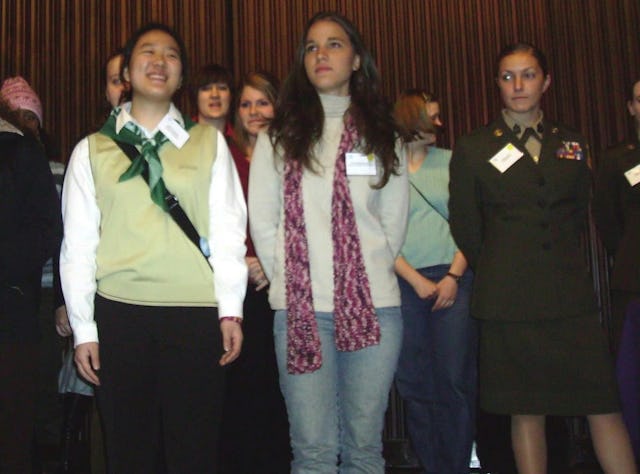Baha'i girls to bring a message of hope to UN meeting on women
NEW YORK, United States — Among the hundreds of girls coming to the United Nations this week to discuss the problems facing girl children around the world will be a dozen with a distinctive viewpoint: their religion teaches that they are equal to boys.
"For Baha'is, it is a basic element of their faith that we must establish equality between women and men, not to mention girls and boys," said Fulya Vekiloglu, a representative of the Baha'i International Community to the United Nations.
"In a world where religious traditions often stand at the heart of discriminatory practices, this is a rather unique perspective, and one that ought to be a pattern for the future," said Ms. Vekiloglu, who also directs the Community's Office for the Advancement of Women.
"So we are hopeful that the 12 young Baha'i girls who are coming to New York for the Commission on the Status of Women next week can bring concrete examples of equality and empowerment in action."
Girl delegates will be coming from Baha'i communities in Brazil, Canada, India, Italy, Sweden, Tanzania, the United Kingdom, and the United States to the UN Commission on the Status of Women meeting, which this year will address as its priority theme: "The elimination of all forms of discrimination and violence against the girl child."
Many of the delegates have experience helping other girls or in teaching principles of equality to their peers, added Ms. Vekiloglu, who is also a member of the Working Group on Girls of the NGO Committee of UNICEF.
"In their own communities, young as they are, they have taken a leading role in advocating for equality and in teaching that concept to other young people," said Ms. Vekiloglu. Among those coming to New York are:
-- Anisa Andrade de Araujo, 17, from Brazil. Born into a Baha'i family, Anisa has been engaged in teaching moral education classes for children in Brasilia. Among other things, these emphasize the equality of the sexes.
"Kids are the ones who will lead humanity," Anisa said of her teaching efforts. "If you nourish in them some virtues and spiritual manners, for a significant number of people this world would be a decent place to live."
-- Ahenliema Koijam, 16, of India. A Baha'i since 2001, Ahenliema has been working with children and youth groups in her native city of Imphal since 2003. She has also participated in a public hearing on human rights there, and is especially concerned about the rights of girls in the province of Manipur, which surrounds Imphal.
"The children of Manipur are facing many forms of discrimination," said Ahenliema. "In most of the rural areas, children, especially girls, are not allowed to go to school. They are considered as private property and made to do all the household work. Many girl children come to sell vegetables in the market places right from the early morning and go back late in the afternoon."
-- Holly May Smith, 13, from the United Kingdom. Born into a Baha'i family, Holly grew up in Zambia but has lived in the United Kingdom for the last two years, where she is part of a Baha'i youth group that meets every week to discuss topics on spiritual and moral principles, including the equality of women and men.
"While I was in Zambia I noticed that a lot of women got a raw deal," said Holly. "I was surprised to come here [to the UK] and find that women here have it pretty bad too. Women here have to worry about what they wear, how they look, how much they weigh. That is not liberating! Here, women are exploited by advertising and the media. I think it is so unfair that a woman and a man can do the same job and the man will get more money."
The Commission on the Status of Women meets this week, from 26 February to 9 March 2007. Baha'i girls will also participate in several important side events.
On Wednesday, 28 February, they will participate in an event titled "Eliminating Violence Across Generations" at 1:15 to 2:45 pm at Dag Hammarskjold Auditorium in the UN Building. The event is sponsored by the Permanent Mission of the United Kingdom to the United Nations and co-sponsored by the Baha'i International Community.
On Thursday, 1 March, Ahenleima Koijam will participate in a panel discussion on the topic of "Gender-Based Violence: Consequences Across the Life Span," held 10 to 11:45 am at the UN Church Center, Boss Room, 8th floor.
